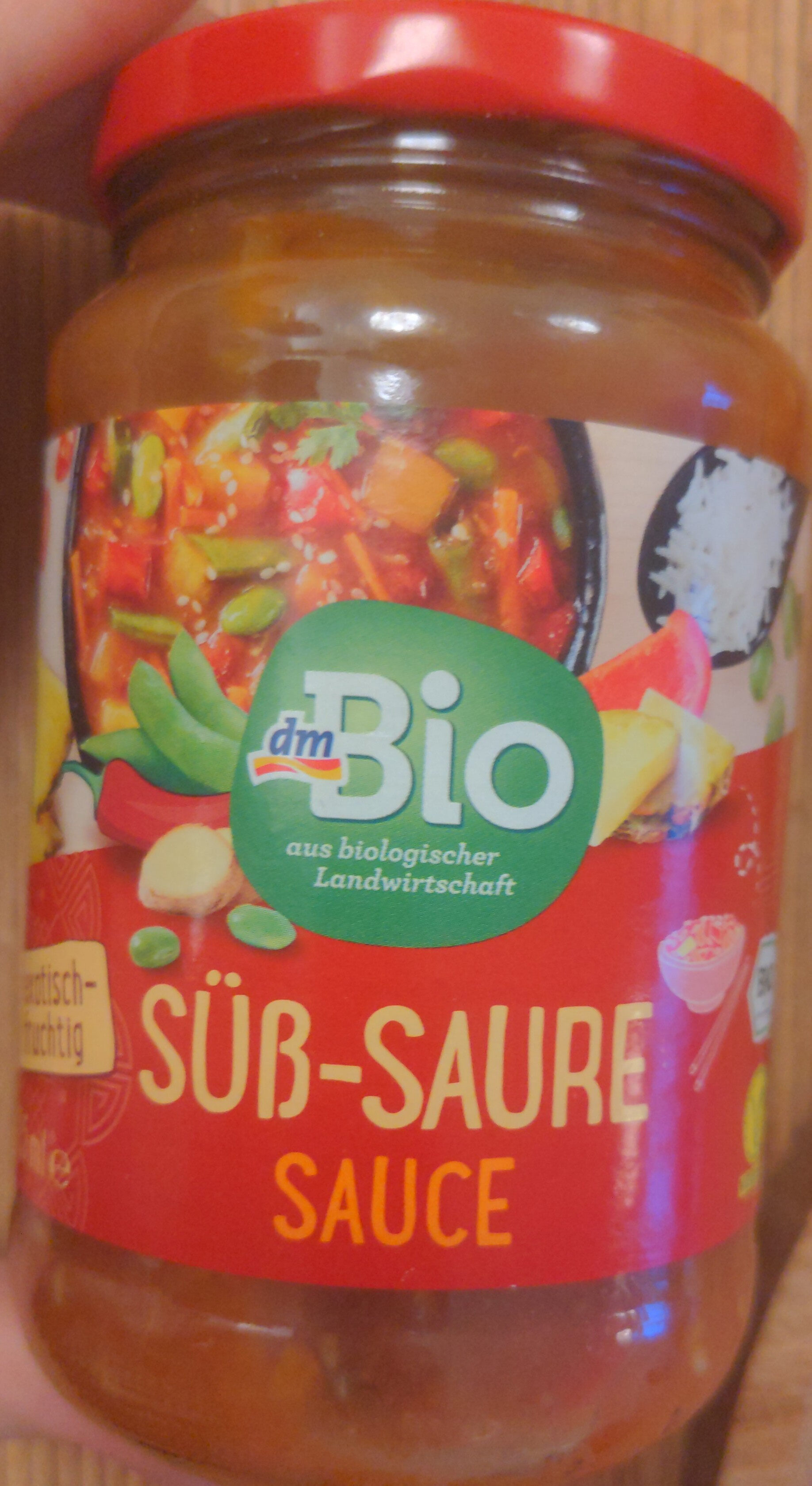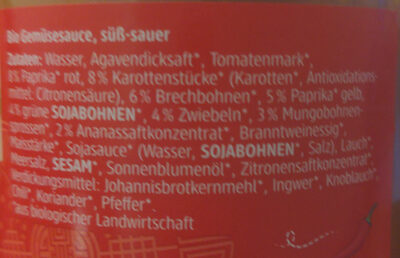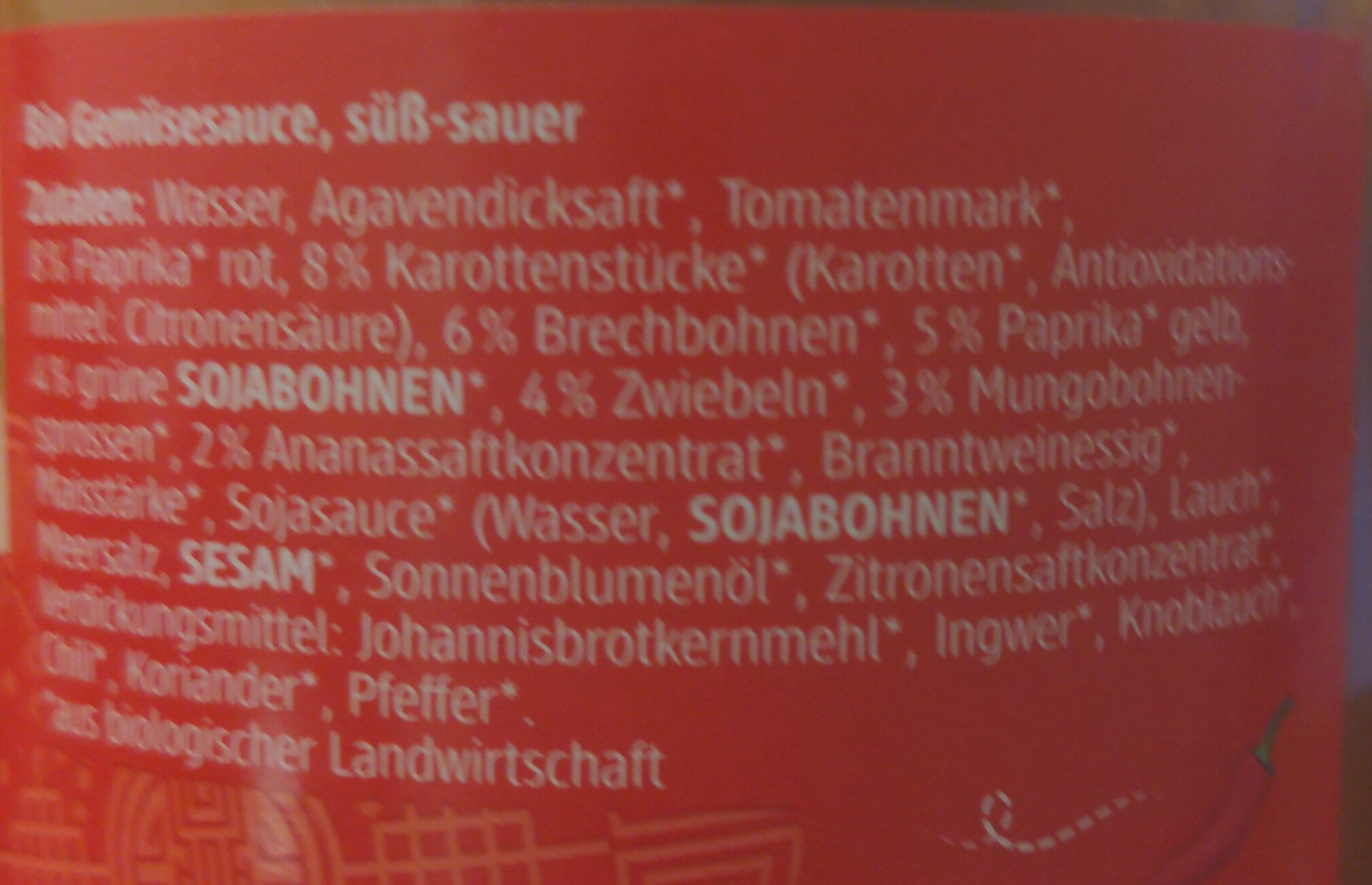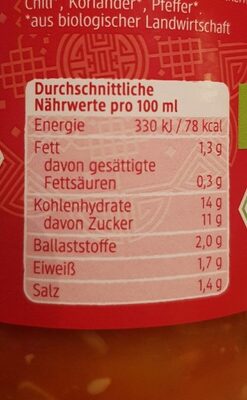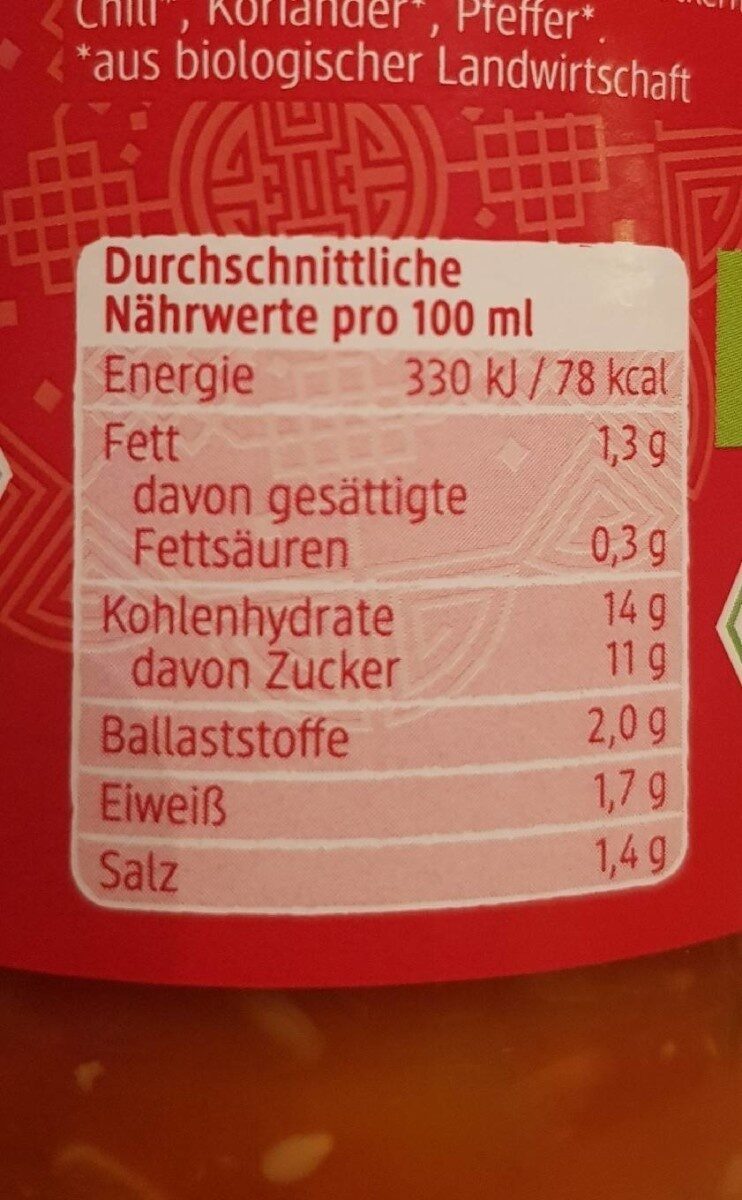Help us make food transparency the norm!
As a non-profit organization, we depend on your donations to continue informing consumers around the world about what they eat.
The food revolution starts with you!
Süß saure SAUCE - dm bio - 325ml
Süß saure SAUCE - dm bio - 325ml
This product page is not complete. You can help to complete it by editing it and adding more data from the photos we have, or by taking more photos using the app for Android or iPhone/iPad. Thank you!
×
Barcode: 4058172326837 (EAN / EAN-13)
Quantity: 325ml
Brands: dm bio
Categories: Condiments, Sauces, Sweet and sour sauces, Groceries
Labels, certifications, awards:
Organic, Vegetarian, EU Organic, Vegan, EG-Öko-Verordnung, DE-ÖKO-003, European Vegetarian Union, European Vegetarian Union Vegan, Made in Germany



Matching with your preferences
Health
Ingredients
-
29 ingredients
: Wasser, Agavendicksaft, Tomatenmark 8S Faprika rot, 8% Karottenstücke (Karotten, Antioxidations mitel: Citronensaure), 6 % Brechbohnen, 5% Paprika'; gelb grine SOJABOHNEN, 4 % Zwiebeln, 3% Mungobohnen SrOssen, 2% Ananassaftkonzentrat, Branntweinessig'; Naisstarke, Sojasauce* (Wasser, SOJABOHNEN', Salz), Lauch Neersalz, SESAM, Sonnenblumenöl';, Zitronensaftkonzentrat Rendickungsmittel: Johannisbrotkernmehl';, Ingwer';, Knoblauch Ohir, Koriander, Pfeffer*. as biologischer LandwirtschaftAllergens: Sesame seeds, Soybeans
Food processing
-
Processed foods
Elements that indicate the product is in the 3 - Processed foods group:
- Ingredient: Salt
- Ingredient: Vegetable oil
- Ingredient: Sauce
Food products are classified into 4 groups according to their degree of processing:
- Unprocessed or minimally processed foods
- Processed culinary ingredients
- Processed foods
- Ultra processed foods
The determination of the group is based on the category of the product and on the ingredients it contains.
Additives
-
E330 - Citric acid
Citric acid is a natural organic acid found in citrus fruits such as lemons, oranges, and limes.
It is widely used in the food industry as a flavor enhancer, acidulant, and preservative due to its tart and refreshing taste.
Citric acid is safe for consumption when used in moderation and is considered a generally recognized as safe (GRAS) food additive by regulatory agencies worldwide.
Ingredients analysis
-
Palm oil content unknown
Unrecognized ingredients: de:tomatenmark-8s-faprika-rot, de:antioxidations-mitel, de:brechbohnen, de:gelb-grine-sojabohnen, de:mungobohnen-srossen, de:naisstarke, de:lauch-neersalz, de:zitronensaftkonzentrat-rendickungsmittel, de:knoblauch-ohir, de:as-landwirtschaftSome ingredients could not be recognized.
We need your help!
You can help us recognize more ingredients and better analyze the list of ingredients for this product and others:
- Edit this product page to correct spelling mistakes in the ingredients list, and/or to remove ingredients in other languages and sentences that are not related to the ingredients.
- Add new entries, synonyms or translations to our multilingual lists of ingredients, ingredient processing methods, and labels.
If you would like to help, join the #ingredients channel on our Slack discussion space and/or learn about ingredients analysis on our wiki. Thank you!
-
Vegan
No non-vegan ingredients
Unrecognized ingredients: de:tomatenmark-8s-faprika-rot, de:antioxidations-mitel, de:brechbohnen, de:gelb-grine-sojabohnen, de:mungobohnen-srossen, de:naisstarke, de:lauch-neersalz, de:zitronensaftkonzentrat-rendickungsmittel, de:knoblauch-ohir, de:as-landwirtschaftSome ingredients could not be recognized.
We need your help!
You can help us recognize more ingredients and better analyze the list of ingredients for this product and others:
- Edit this product page to correct spelling mistakes in the ingredients list, and/or to remove ingredients in other languages and sentences that are not related to the ingredients.
- Add new entries, synonyms or translations to our multilingual lists of ingredients, ingredient processing methods, and labels.
If you would like to help, join the #ingredients channel on our Slack discussion space and/or learn about ingredients analysis on our wiki. Thank you!
-
Vegetarian
No non-vegetarian ingredients detected
Unrecognized ingredients: de:tomatenmark-8s-faprika-rot, de:antioxidations-mitel, de:brechbohnen, de:gelb-grine-sojabohnen, de:mungobohnen-srossen, de:naisstarke, de:lauch-neersalz, de:zitronensaftkonzentrat-rendickungsmittel, de:knoblauch-ohir, de:as-landwirtschaftSome ingredients could not be recognized.
We need your help!
You can help us recognize more ingredients and better analyze the list of ingredients for this product and others:
- Edit this product page to correct spelling mistakes in the ingredients list, and/or to remove ingredients in other languages and sentences that are not related to the ingredients.
- Add new entries, synonyms or translations to our multilingual lists of ingredients, ingredient processing methods, and labels.
If you would like to help, join the #ingredients channel on our Slack discussion space and/or learn about ingredients analysis on our wiki. Thank you!
-
Details of the analysis of the ingredients
We need your help!
Some ingredients could not be recognized.
We need your help!
You can help us recognize more ingredients and better analyze the list of ingredients for this product and others:
- Edit this product page to correct spelling mistakes in the ingredients list, and/or to remove ingredients in other languages and sentences that are not related to the ingredients.
- Add new entries, synonyms or translations to our multilingual lists of ingredients, ingredient processing methods, and labels.
If you would like to help, join the #ingredients channel on our Slack discussion space and/or learn about ingredients analysis on our wiki. Thank you!
: Wasser, Agavendicksaft, Tomatenmark 8S Faprika rot, Karotten 8% (Karotten, Antioxidations mitel (Citronensaure)), Brechbohnen 6%, Paprika 5%, gelb grine SOJABOHNEN, Zwiebeln 4%, Mungobohnen SrOssen 3%, Ananassaftkonzentrat 2%, Branntweinessig, Naisstarke, Sojasauce (Wasser, SOJABOHNEN, Salz), Lauch Neersalz, SESAM, Sonnenblumenöl, Zitronensaftkonzentrat Rendickungsmittel (Johannisbrotkernmehl), Ingwer, Knoblauch Ohir, Koriander, Pfeffer, as Landwirtschaft- Wasser -> en:water - vegan: yes - vegetarian: yes - ciqual_food_code: 18066 - percent_min: 8 - percent_max: 52
- Agavendicksaft -> en:concentrated-agave-syrup - vegan: yes - vegetarian: yes - ciqual_food_code: 31089 - percent_min: 8 - percent_max: 30
- Tomatenmark 8S Faprika rot -> de:tomatenmark-8s-faprika-rot - percent_min: 8 - percent_max: 22.6666666666667
- Karotten -> en:carrot - vegan: yes - vegetarian: yes - ciqual_food_code: 20009 - percent_min: 8 - percent: 8 - percent_max: 8
- Karotten -> en:carrot - vegan: yes - vegetarian: yes - ciqual_food_code: 20009 - percent_min: 4 - percent_max: 8
- Antioxidations mitel -> de:antioxidations-mitel - percent_min: 0 - percent_max: 4
- Citronensaure -> en:e330 - vegan: yes - vegetarian: yes - percent_min: 0 - percent_max: 4
- Brechbohnen -> de:brechbohnen - percent_min: 6 - percent: 6 - percent_max: 6
- Paprika -> en:spice-or-bell-pepper - vegan: yes - vegetarian: yes - ciqual_food_code: 20041 - percent_min: 5 - percent: 5 - percent_max: 5
- gelb grine SOJABOHNEN -> de:gelb-grine-sojabohnen - percent_min: 4 - percent_max: 5
- Zwiebeln -> en:onion - vegan: yes - vegetarian: yes - ciqual_food_code: 20034 - percent_min: 4 - percent: 4 - percent_max: 4
- Mungobohnen SrOssen -> de:mungobohnen-srossen - percent_min: 3 - percent: 3 - percent_max: 3
- Ananassaftkonzentrat -> en:concentrated-pineapple-juice - vegan: yes - vegetarian: yes - ciqual_food_code: 13716 - percent_min: 2 - percent: 2 - percent_max: 2
- Branntweinessig -> en:spirit-vinegar - vegan: yes - vegetarian: yes - ciqual_food_code: 11018 - percent_min: 0 - percent_max: 2
- Naisstarke -> de:naisstarke - percent_min: 0 - percent_max: 2
- Sojasauce -> en:soy-sauce - vegan: maybe - vegetarian: maybe - ciqual_food_code: 11104 - percent_min: 0 - percent_max: 2
- Wasser -> en:water - vegan: yes - vegetarian: yes - ciqual_food_code: 18066 - percent_min: 0 - percent_max: 2
- SOJABOHNEN -> en:soya-bean - vegan: yes - vegetarian: yes - ciqual_food_code: 20901 - percent_min: 0 - percent_max: 1
- Salz -> en:salt - vegan: yes - vegetarian: yes - ciqual_food_code: 11058 - percent_min: 0 - percent_max: 0.666666666666667
- Lauch Neersalz -> de:lauch-neersalz - percent_min: 0 - percent_max: 2
- SESAM -> en:sesame - vegan: yes - vegetarian: yes - ciqual_food_code: 15010 - percent_min: 0 - percent_max: 2
- Sonnenblumenöl -> en:sunflower-oil - vegan: yes - vegetarian: yes - from_palm_oil: no - ciqual_food_code: 17440 - percent_min: 0 - percent_max: 2
- Zitronensaftkonzentrat Rendickungsmittel -> de:zitronensaftkonzentrat-rendickungsmittel - percent_min: 0 - percent_max: 2
- Johannisbrotkernmehl -> en:carob-seed-flour - vegan: yes - vegetarian: yes - ciqual_proxy_food_code: 9410 - percent_min: 0 - percent_max: 2
- Ingwer -> en:ginger - vegan: yes - vegetarian: yes - ciqual_food_code: 11074 - percent_min: 0 - percent_max: 2
- Knoblauch Ohir -> de:knoblauch-ohir - percent_min: 0 - percent_max: 2
- Koriander -> en:coriander - vegan: yes - vegetarian: yes - percent_min: 0 - percent_max: 2
- Pfeffer -> en:pepper - vegan: yes - vegetarian: yes - percent_min: 0 - percent_max: 2
- as Landwirtschaft -> de:as-landwirtschaft - labels: en:organic - percent_min: 0 - percent_max: 2
Nutrition
-
Average nutritional quality
⚠ ️Warning: the amount of fiber is not specified, their possible positive contribution to the grade could not be taken into account.⚠ ️Warning: the amount of fruits, vegetables and nuts is not specified on the label, it was estimated from the list of ingredients: 14This product is not considered a beverage for the calculation of the Nutri-Score.
Positive points: 1
- Proteins: 1 / 5 (value: 1.7, rounded value: 1.7)
- Fiber: 0 / 5 (value: 0, rounded value: 0)
- Fruits, vegetables, nuts, and colza/walnut/olive oils: 0 / 5 (value: 14.1458333333333, rounded value: 14.1)
Negative points: 8
- Energy: 0 / 10 (value: 326, rounded value: 326)
- Sugars: 2 / 10 (value: 11, rounded value: 11)
- Saturated fat: 0 / 10 (value: 0.3, rounded value: 0.3)
- Sodium: 6 / 10 (value: 560, rounded value: 560)
The points for proteins are counted because the negative points are less than 11.
Nutritional score: (8 - 1)
Nutri-Score:
-
Nutrient levels
-
Fat in low quantity (1.3%)
What you need to know- A high consumption of fat, especially saturated fats, can raise cholesterol, which increases the risk of heart diseases.
Recommendation: Limit the consumption of fat and saturated fat- Choose products with lower fat and saturated fat content.
-
Saturated fat in low quantity (0.3%)
What you need to know- A high consumption of fat, especially saturated fats, can raise cholesterol, which increases the risk of heart diseases.
Recommendation: Limit the consumption of fat and saturated fat- Choose products with lower fat and saturated fat content.
-
Sugars in moderate quantity (11%)
What you need to know- A high consumption of sugar can cause weight gain and tooth decay. It also augments the risk of type 2 diabetes and cardio-vascular diseases.
Recommendation: Limit the consumption of sugar and sugary drinks- Sugary drinks (such as sodas, fruit beverages, and fruit juices and nectars) should be limited as much as possible (no more than 1 glass a day).
- Choose products with lower sugar content and reduce the consumption of products with added sugars.
-
Salt in moderate quantity (1.4%)
What you need to know- A high consumption of salt (or sodium) can cause raised blood pressure, which can increase the risk of heart disease and stroke.
- Many people who have high blood pressure do not know it, as there are often no symptoms.
- Most people consume too much salt (on average 9 to 12 grams per day), around twice the recommended maximum level of intake.
Recommendation: Limit the consumption of salt and salted food- Reduce the quantity of salt used when cooking, and don't salt again at the table.
- Limit the consumption of salty snacks and choose products with lower salt content.
-
-
Nutrition facts
Nutrition facts As sold
for 100 g / 100 mlCompared to: Sweet and sour sauces Energy 326 kj
(78 kcal)-14% Fat 1.3 g +105% Saturated fat 0.3 g Carbohydrates 14 g -28% Sugars 11 g -35% Fiber ? Proteins 1.7 g +101% Salt 1.4 g +51% Fruits‚ vegetables‚ nuts and rapeseed‚ walnut and olive oils (estimate from ingredients list analysis) 14.146 %
Environment
-
Eco-Score B - Low environmental impact
The Eco-Score is an experimental score that summarizes the environmental impacts of food products.→ The Eco-Score was initially developped for France and it is being extended to other European countries. The Eco-Score formula is subject to change as it is regularly improved to make it more precise and better suited to each country.Life cycle analysis
-
Average impact of products of the same category: A (Score: 93/100)
Category: Sweet and sour sauce, prepacked
Category: Sweet and sour sauce, prepacked
- PEF environmental score: 0.17 (the lower the score, the lower the impact)
- including impact on climate change: 1.06 kg CO2 eq/kg of product
Stage Impact Agriculture
37.9 %Processing
24.2 %Packaging
16.5 %Transportation
11.9 %Distribution
5.5 %Consumption
3.9 %
Bonuses and maluses
-
Labels with high environmental benefits
Bonus: +15
-
EU Organic
Organic agriculture contributes to preserve biodiversity, climate, water quality and soil fertility.
Organic food is food produced by methods complying with the standards of organic farming and features practices that cycle resources, promote ecological balance, and conserve biodiversity.
-
-
Missing origins of ingredients information
Malus: -5
⚠ ️ The origins of the ingredients of this product are not indicated.
If they are indicated on the packaging, you can modify the product sheet and add them.
If you are the manufacturer of this product, you can send us the information with our free platform for producers.
-
Missing packaging information for this product
Malus: -15
⚠ ️ The information about the packaging of this product is not filled in.⚠ ️ For a more precise calculation of the Eco-Score, you can modify the product page and add them.
If you are the manufacturer of this product, you can send us the information with our free platform for producers.
Eco-Score for this product
-
Impact for this product: B (Score: 79/100)
Product: Süß saure SAUCE - dm bio - 325ml
Life cycle analysis score: 93
Sum of bonuses and maluses: -5
Final score: 79/100 (The score of products with non-recyclable and non-biodegradable packaging materials is capped at 79 (grade B).)
-
Carbon footprint
-
Equal to driving 0.5 km in a petrol car
106 g CO² per 100g of product
The carbon emission figure comes from ADEME's Agribalyse database, for the category: Sweet and sour sauce, prepacked (Source: ADEME Agribalyse Database)
Stage Impact Agriculture
27.4 %Processing
20.0 %Packaging
23.8 %Transportation
23.4 %Distribution
3.7 %Consumption
1.7 %
Packaging
-
Missing packaging information for this product
⚠ ️ The information about the packaging of this product is not filled in.Take a photo of the recycling information Take a photo of the recycling information
Transportation
-
Origins of ingredients
Missing origins of ingredients information
⚠ ️ The origins of the ingredients of this product are not indicated.
If they are indicated on the packaging, you can modify the product sheet and add them.
If you are the manufacturer of this product, you can send us the information with our free platform for producers.Add the origins of ingredients for this product Add the origins of ingredients for this product
Labels
-
EU Organic
Organic agriculture contributes to preserve biodiversity, climate, water quality and soil fertility.
Organic food is food produced by methods complying with the standards of organic farming and features practices that cycle resources, promote ecological balance, and conserve biodiversity.
Report a problem
-
Incomplete or incorrect information?
Category, labels, ingredients, allergens, nutritional information, photos etc.
If the information does not match the information on the packaging, please complete or correct it. Open Food Facts is a collaborative database, and every contribution is useful for all.
Data sources
Product added on by prepperapp
Last edit of product page on by itsjustruby.
Product page also edited by kiliweb, openfoodfacts-contributors, roboto-app, shisma, tacite-mass-editor, teolemon, yuka.sY2b0xO6T85zoF3NwEKvllUbb9nbhACYPT_umHOS6PqqKqPoQ4gq64_FMas.

